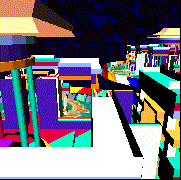
| I am reminded
here of the Argentine author Jorge Luis Borges's story about the universal
library, "The Library of Babel" (1944). The library is not only the same
size as the universe; it is a metaphor of the universe. Enormous hexagonal
halls of books stretch to infinity. Unfortunately, the books appear to
be infinite too, containing every possible combination of letters, rendering
them, at best incomplete and mostly unintelligible. The most serious omission
is a catalogue. One librarian admits: "I have squandered and consumed my
years in adventures of this type. To me, it does not seem unlikely that
on some shelf of the universe there lies a total book. I pray the unknown
gods that some man- even if only one man, and though it may have been thousands
of years ago!- may have examined and read it. If honor and wisdom and happiness
are not for me, let them be for others."
|
 |
| Borges's Library of Babel resembles a mandala in construction and the search for the catalogue resembles humankind's search for enlightenment. |
 |
Similarly, many people
who seek answers to the fundamental questions of life may also discover
little that makes sense. Some people plead with supernatural forces or
great spiritual masters for answers. The Buddha steered clear of metaphysical
gymnastics, often by just saying nothing. In a story that appears in the
Avyakata samyutta, a mendicant named Vacchagotta asks the Buddha
if there is a self. The Buddha remains silent. So, Vacchagotta asks if
that means that there is no self. Again, the Buddha says nothing. After
Vacchagotta left, Ananda, one of the Buddha's favorite disciples asked
why he gave no answer. The Buddha then explains the futility and misleading
nature of taking rhetorical positions. Indeed, Avyakata means "indeterminate"
or "inexpressible." Scholars often interpret Avyakata as implying
that all metaphysical constructs are absurd.
|